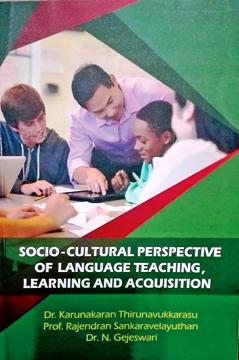
Authors: Dr Karunakaran Thirunavukkarasu, Prof. Rajendran Sankaravelayuthan and Dr N. Gajeswari
Sarasavi Publishers, Nugegoda
Price: Rs 650
Socio-Cultural Perspective of Language Teaching, Learning and Acquisition is a useful book for those interested in language teaching. The book discusses the origin and expansion of the language, strategies and theories of language learning and teaching, nuances of language acquisition and language learning, socio-cultural dimensions of language teaching and learning, teaching and learning of English in non-native countries.
In the absence of a contents page I found it difficult to scan the book before reading it from chapter one to five. The last chapter on ‘Teaching and learning of English in non-native countries’ would be of value to Sri Lankan students, teachers and scholars. The authors are of the view that English enjoys its superior status because of its capacity to carry a ‘vehicular load’ and it is a medium for science, technology and literature. Everybody agrees that English has become the lingua franca of the modern world. What is more, globalization has pushed it forward as the language of business and technology.
The authors say there are over 600 million users of English throughout the world, half of them non-native speakers of English. One day the non-native speakers of English would outnumber the native speakers.
The situation of English learning and teaching in modern Sri Lanka is something everybody is worried about. English remained as the official language of the country from 1815 to 1956 when Sinhala was made the official language. Those who were born before 1956 had the privilege of attending English medium schools. However, the situation changed with the government policy to treat English as only a second language or a link language. Those who knew English well were able to procure well-paid jobs. The situation has not changed although English education took a nosedive during the past few decades.
The decline of English teaching began with the Official Language Act No 33 which declared Sinhala as the only official language of Sri Lanka. It replaced English which had been imposed as the official language under British colonial rule. Even after 1956, English did not lose its prestigious position. It continued to be the language of the elite and the academic classes. After the 1987 amendment to the Official Language Act, English became a link language.
The authors say English in Sri Lanka is fluently spoken by approximately 10 per cent of the population. It is also widely used for official and commercial purposes. The multiplicity of standard forms of English has become a formidable problem for the language teacher. Today, there are many acceptable standards of English. This kind of advice may be good for those who already know the language well. When you start teaching English to beginners, the problem arises as to what Standard English should be taught.
Although English is taught from Grades 3 to 13 most Sri Lankan students are not competent users of the language. Even today those who are fluent in English are products of the old colonial education system. With Sri Lankan English gaining ground, language teachers face the challenge of teaching Standard English to young learners. The authors believe it is difficult today to talk about a single authoritative form of English. There seems to be a number of standards.
Most English teachers are worried about the methods of teaching. When I attended an interview the first question the interviewer asked me was: “What is your method of teaching English?” The authors have tried to answer this question in the epilogue.
They say the crucial components of any organized language program are the methods and material used to enhance students’ learning experiences. I agree with their following statement: “There is no one correct way to teach language nor is there any one text or computer program which would suffice in its entirety. Since teaching must be based on the students’ needs and diagnosed levels of ability, the instructor is in the key position to determine the levels of their abilities.”
Socio-Cultural Perspectives of Language Teaching, Learning and Acquisition is a well-researched work which should be read by those who learn and teach English in Sri Lanka or elsewhere in the world. The book comes with a useful bibliography which has enhanced its value.
